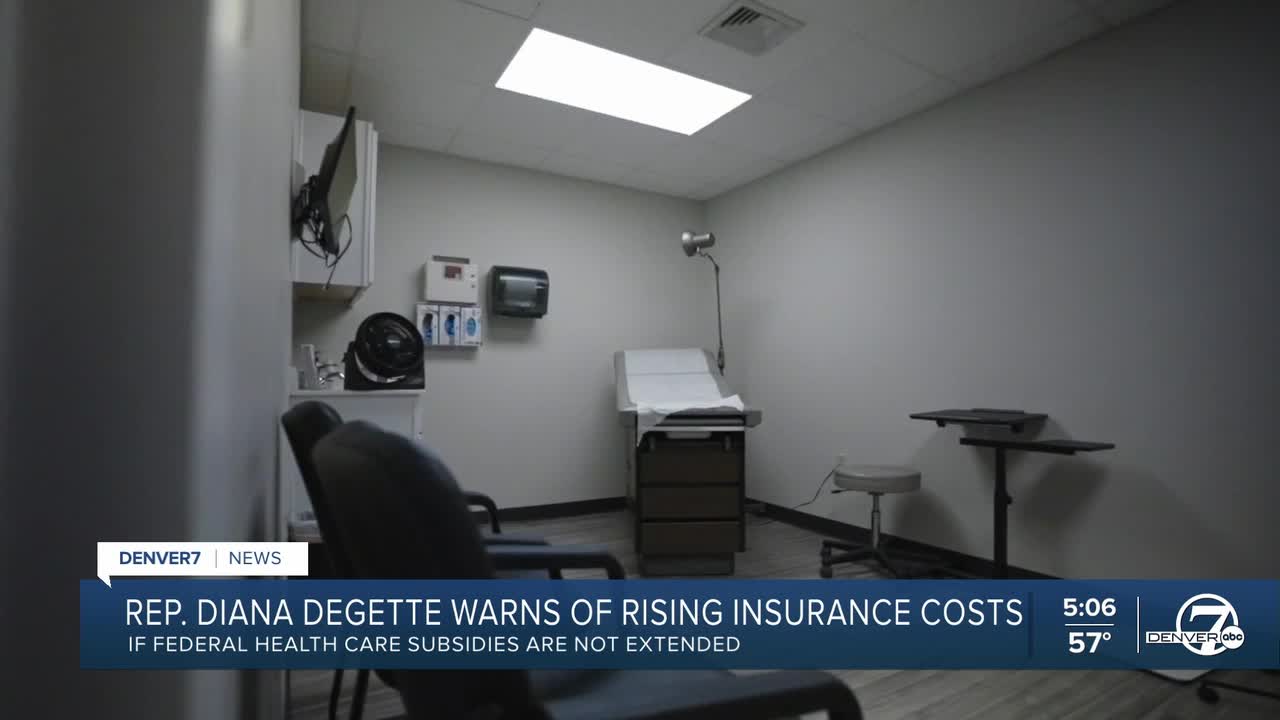DENVER — Colorado Congresswoman Diana DeGette, a Democrat, held a press conference with the Colorado Insurance Commissioner on Monday, warning about rising health care costs if subsidies are not extended — the issue at the center of the government shutdown.
DeGette said 300,000 Coloradans on Affordable Care Act Plans, like Connect for Health Colorado, will see a massive insurance increase on average of 30% next year, compared to a 5.6% increase in 2025.
“We're smack dab in the middle of the government shutdown because the Republicans in Congress are ignoring the fact that health care costs are about to skyrocket in this country,” DeGette said.
Extending the Affordable Care Act subsidies is the key issue Democrats want resolved in the continuing resolution to reopen the government.
Notices on insurance premiums are set to go out on Nov. 1st.
Colorado Insurance Commissioner Michael Conway called it a crisis that will hit rural Coloradans the hardest.
Conway said a family of four on the Silver Plan living on the Front Range will see an increase of $13,000 next year, but if they live on the Western Slope, that premium will be between $22,000 and $26,000.
“That is unfathomable,” Conway said. “You're going to hear families that choose not to buy groceries in a particular month because they have a family member who is in the midst of cancer treatment.”
Denver resident Chelsey Baker-Hauck shared how rising premiums will affect her and her family. She is permanently disabled after a COVID-19 infection damaged her heart, and she developed an autoimmune disease. She said expensive treatments allow her to work part-time.
She estimates that if the subsidies expire, her insurance premiums will consume 40% of her income next year.
“At this point, we're left with choices like, do I pay for health care, or do I buy food? Do I pay our $300 heating bill each month?” Baker said. “I want to send a message to the rest of you, all in Congress, including Colorado Republicans: Do your jobs. You need to lower the cost of health care. You need to extend the enhanced premium tax credits yesterday.”
Conway warned that 75,000 to 100,000 Coloradans could lose access to their health insurance if the subsidies are not extended. That could ultimately impact the employer insurance market.
“People are still going to get sick and they're still going to go to the hospital, and if they don't have health insurance coverage, that's going to become uncompensated care for hospitals, and the hospitals will roll that into the rest of the insurance market,” Conway said.
Colorado Congressman Jeff Hurd, a Republican who co-sponsored the Bipartisan Premium Tax Credit Extension Act, said Democrats are using this issue as “leverage in a larger funding fight.”
Republicans want to approve the continuing resolution to fund the government through Nov. 21 then negotiate legislation to extend the tax credits.
Here is Hurd's full statement to Denver7:
“I share the concern many families in western Colorado feel as they learn of the potential expiration of premium subsidies under the Bipartisan Premium Tax Credit Extension Act. Health care is already expensive, and uncertainty about looming premium hikes only makes things harder for working families, seniors, and small business owners. There is still time for Congress to act before the end of the year, and that is why I have co-sponsored bipartisan legislation to extend these tax credits and provide needed stability for Coloradans.
Let us be clear. The expiration date was written into law when Democrats passed the last extension. They set this deadline, and they had the ability to plan for it. Instead of resolving this earlier in the budget process, it is now being used as leverage in a larger funding fight. That kind of brinkmanship is not good for Colorado families. It creates uncertainty and distracts from actually solving the problem. I do not believe this should be used as a bargaining chip in shutdown politics. People’s health care is too important for partisan games. We need a clean, targeted fix that extends these tax credits and provides certainty for families, while also working toward long-term solutions that bring down costs. But we also have to be honest about something larger. Our health care system is broken. We cannot keep throwing more money at rising costs and pretending that will fix the problem. That approach is not sustainable. We need to focus on structural changes that address the root causes of high costs, expand access to affordable care.”
Colorado Congressman Jeff Crank, a Republican, shared a similar statement with Denver7.
“Senate Democrats are playing games with the American people. There is a time and place to have a discussion on healthcare, and that is when the federal government has reopened,” Crank said.
DeGette said the time to negotiate is now.
“I’ve never seen the Republicans act on these issues. They've known this crisis was coming up for a year, and they've chosen not to act,” DeGette said.
The subsidies will expire by the end of the year.
On Monday, the Senate failed for the 11th time to pass a vote to fund the government.





